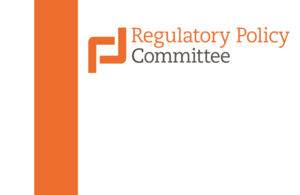Independent watchdog welcomes proposed law to control red tape and increase transparency of policy-making
Regulatory Policy Committee response to the publication of the Small Business, Enterprise and Employment Bill

The Regulatory Policy Committee (RPC), the independent body that reviews the impact of new regulatory proposals on businesses, charities and voluntary groups, welcomed proposals to strengthen independent scrutiny that are included in the Small Business, Enterprise and Employment Bill published today. The RPC also encouraged the government to maximise the potential of the regulatory proposals by ensuring that they result in even greater transparency and use of evidence in policy-making.
The Bill will require future governments to set a target for changes to the regulatory burdens on businesses, charities and voluntary groups, and to report regularly to parliament on progress against the target.
Independent verification of the figures forms a core part of the proposals. The RPC currently provides such validation, including for the costs of proposals covered by the government’s ‘One-in, Two-out’ rule. This rule says that, for every pound of cost imposed on business by new regulation, government departments need to find two pounds of savings to business. The RPC would like to see a system where the costs and benefits of all regulations that affect business and civil society are independently verified, including those that do not count towards any deregulation target.
Chair of the RPC, Michael Gibbons, OBE, said:
Independent scrutiny has become an essential part of the policy-making process. I very much welcome the proposals to enshrine this principle in law.
The committee’s work has improved the accuracy of the government’s regulatory account by nearly £500 million per year in total. We have helped improve the quality of evidence underpinning regulatory changes through scrutinising over 1,600 proposals since 2010.
Notes to editors
The RPC is an independent non-departmental public body, sponsored by the Department for Business, Innovation & Skills. The Committee is formed of eight independent experts from a range of backgrounds, including business, civil society and academia, supported by a secretariat of civil servants.
We assess the quality of evidence and analysis supporting many of the regulatory changes affecting businesses and civil society organisations. We check whether central government departments’ estimated costs or savings to business, as a result of regulatory reforms, are robust. We check that government departments explain why new regulation is more appropriate than the alternative, such as voluntary codes.
The RPC currently helps ensure government departments consider any impacts of regulation on small businesses. Where new regulation is required, the RPC checks that the government explains how it is minimising the effects on small businesses in particular. This requires departments to provide a clear analysis of the potential impact of the proposal on smaller businesses, and the effect of proposed mitigating actions to reduce burdens.
Further information can be found through the RPC website – www.gov.uk/rpc - including published opinions on government’s regulatory proposals, the validated costs and benefits of proposals and analysis on the impact of independent scrutiny on the quality of evidence used by government departments.
Media contact:
Scott McAusland Tel: 07443 506916 Email: ScottM@Ausland.co.uk